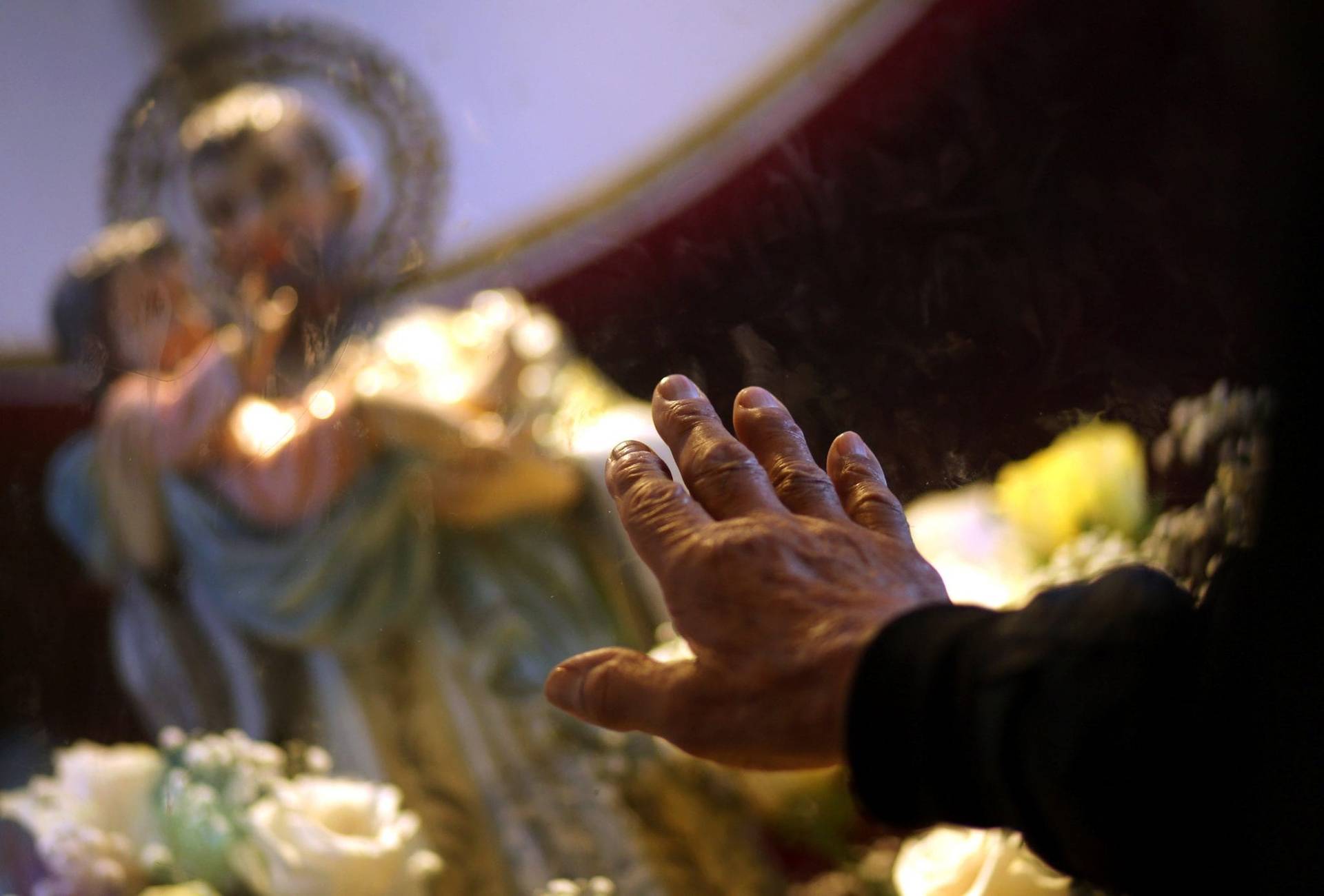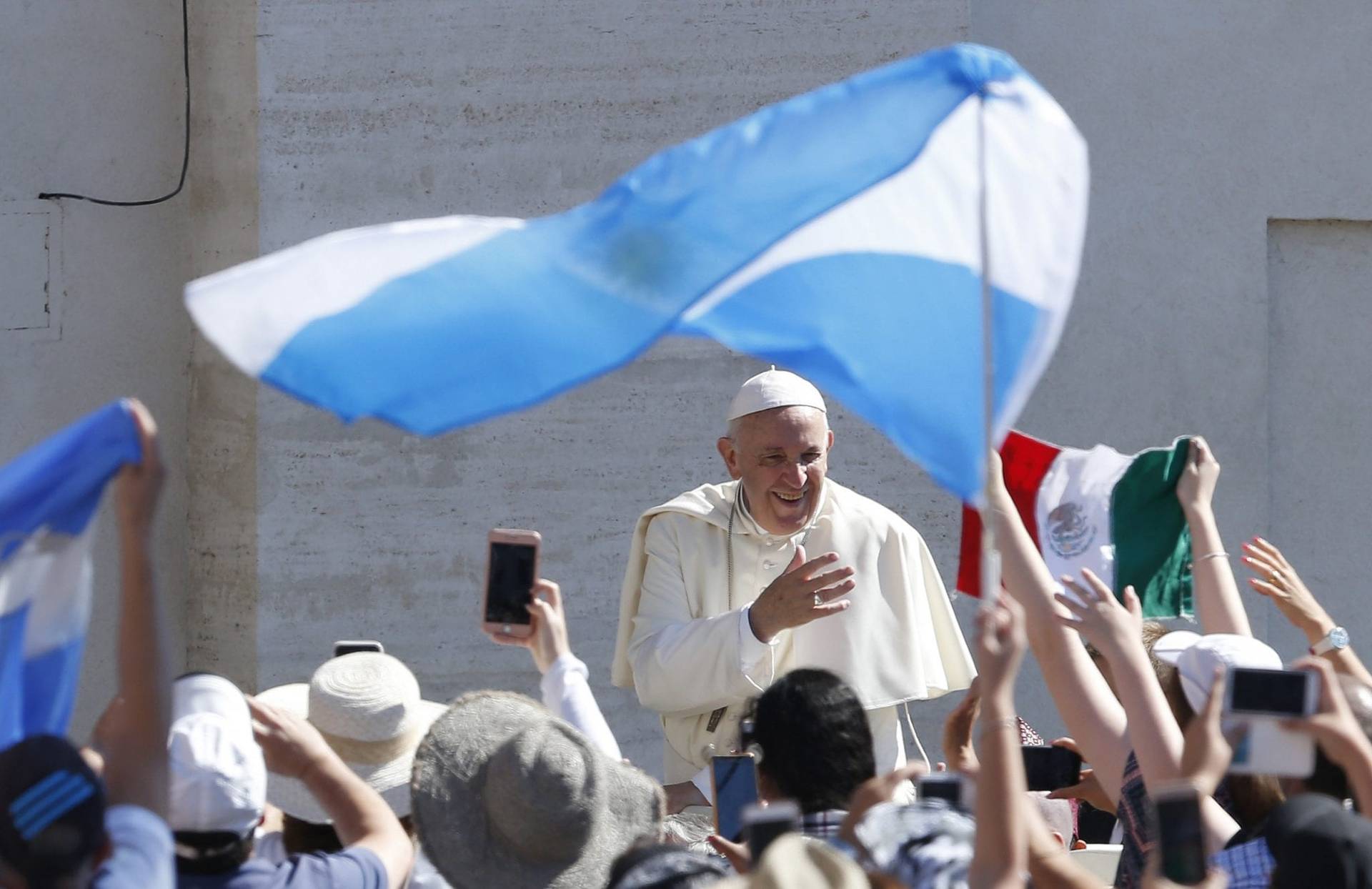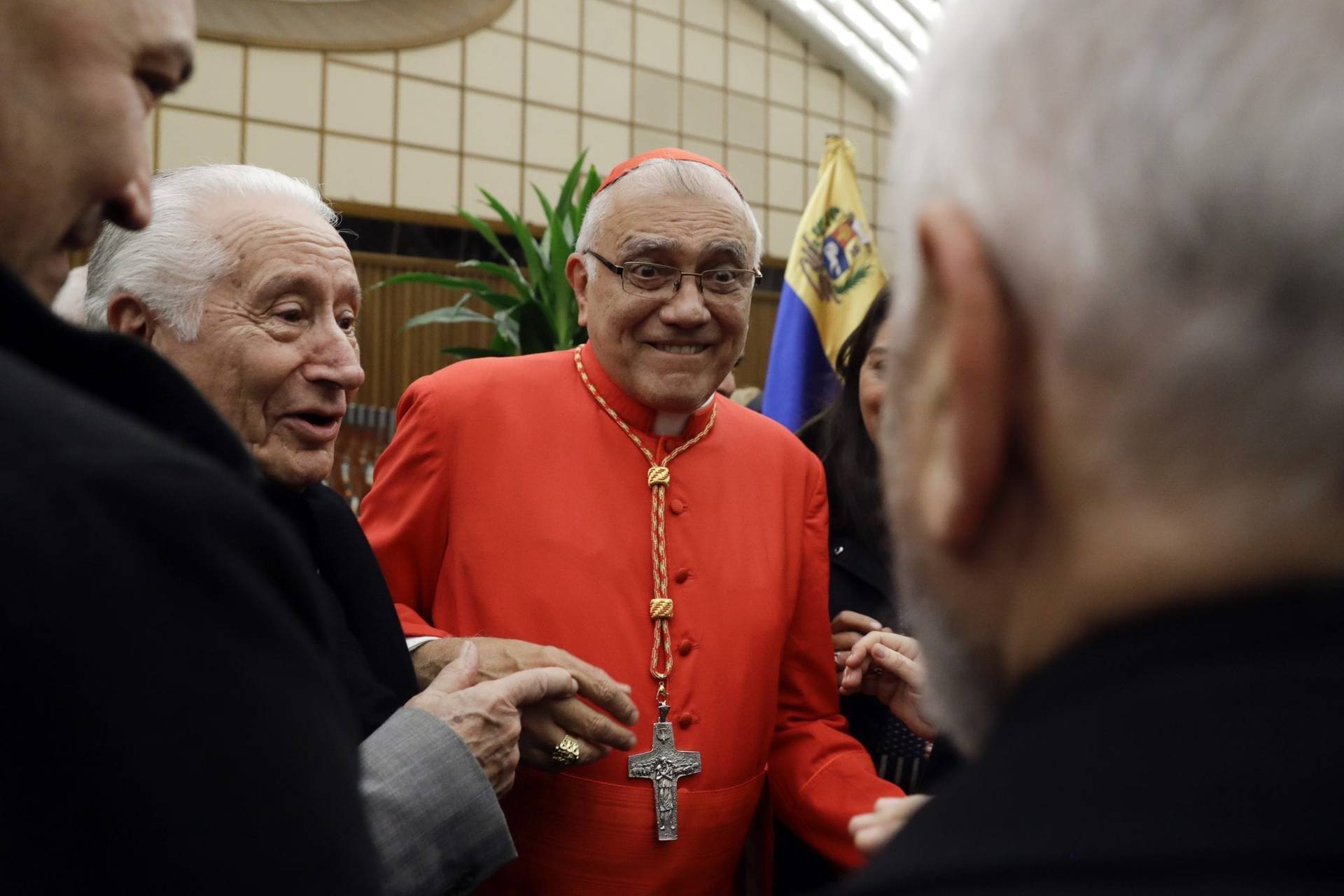ROSARIO, Argentina – During a 2015 interview, Pope Francis told an old joke in his home country: “Do you know how an Argentine commits suicide? By climbing onto his ego and jumping.”
Yet the pontiff actually left part of that joke out: Beyond being egocentric, people who hail from the “ends of the earth” also believe themselves entitled to their high opinions of themselves, to the point that they question the abilities of Lionel Messi, widely considered one of the greatest soccer players in history.
Francis, history’s first pope from the global south, is no exception to the Argentine rule of thumb.
“He’s too political”; “he doesn’t care about us”; “he’s afraid of the reception he’ll get, that’s why he’s avoiding coming home”; “he’s too leftist”; and even “he’s not Catholic enough” are some of the many phrases people from all walks of life used during Crux’s first 48 hours in Argentina.
They come, respectively, from a security guard at the airport, a taxi driver, a grocery store cashier, and a woman pumping gas at a gas station on a highway towards the country’s northern region.
But scraping beneath the surface, another truth arises: None of those who so willingly gave an opinion on the pope have actually read anything he’s said, seen any of his monthly prayer videos or even follow him on Twitter.
“I read in the newspaper that he wouldn’t welcome Margarita Barrientos, yet he sent a rosary to Milagro Sala,” a taxi driver told Crux on Tuesday. “It’s obvious, he’s with Cristina [Fernandez de Kirchner].”
Unpacking that perspective, based solely on one newspaper treatment:
- Barrientos is a social leader who helps feed hundreds of thousands through a network of soup kitchens, runs homes for the elderly and is an important face of the government of President Mauricio Macri. In 2013, she flew to Rome to greet the pope at a Wednesday audience, with no actual invitation. According to her, she was denied entrance to the VIP section by the Vatican’s security personnel- it’s unclear if a Swiss Guard or a member of the gendarmerie- and she took it as the pope personally getting involved, refusing to meet with her. Since then, Francis has invited her to Rome, but citing work demands, she’s never gone. In addition, several people said that when asked, the pontiff confirmed that he did not know Barrientos was in Rome in 2013. In April 2018 she said that she’d like for the pope to “be Catholic” and not so political.
- Milagro Sala is a controversial Tupac Amaru leader. A month after she was imprisoned under fraud and embezzlement charges in 2016, the pope sent her a rosary in response to a letter she had sent to him. Archbishop Manuel Fernandez, often labeled as the pope’s ghostwriter, reminded those with ears to listen that the rosary is an “instrument of prayer.” The pope’s spokesman at the time, Father Federico Lombardi, called it “an instrument for conversion.”
- Christina Fernandez de Kirchner is Argentina’s former president, currently running for vice-president. Although as a senator she’s protected from going to prison, she currently has seven orders of preventive prison for corruption and embezzlement.
In 2018 Francis penned a letter addressed to Argentine women and men who expressed their closeness on the fifth anniversary of his pontificate March 13. On that occasion, he said that his love for Argentina continues to be “great and intense,” and also apologized for gestures he’s made that might have caused offense.
He opened the letter thanking politicians and religious leaders from different backgrounds who wrote him. Among them were people from the government of the conservative Macri and the opposition, as well as union and social leaders. According to the pontiff, the lineup shows that it’s “not impossible to find reasons to come together, and that unity prevails over conflict.”
Yet none of those surveyed by Crux in passing seemed even to know that letter existed.
“I think that time will put things into perspective, and we’ll be able to understand the historical greatness of Jorge Mario Bergoglio,” said Father Fabian Baez, a diocesan priest from Buenos Aires who in 2014, when he was in St. Peter’s Square, was invited by Francis into the popemobile.
“It hurts to see how things are read so shortsightedly, with such a small Argentine-centric perspective,” Baez told Crux.
As an example, Baez noted that last month, while Francis was meeting with leaders of the world’s most important oil companies, in Argentina the pope was being accused of trying to choose who headed the deputy lists for the city of Buenos Aires.
“It’s a very myopic reading that shows we don’t know who Francis is, what the papacy is and the historic role he’s playing,” Baez said. “Sometimes, I wish Francis hailed from Papua New Guinea. Maybe then we’d pay attention to what he says and does, instead of believing a fabricated tale.”
“Rodrigo,” the CEO of one of Argentina’s largest dairy companies located in the central province of Santa Fe, said he doesn’t know anyone who actually rejects the pope, and Argentines at least feel respect for him, even those who disagree with some of Francis’s decisions and statements.
Criticism of the pope, he said, is born from the fact that Argentines “have a tendency to destroy rather than build, to criticize rather than praise.”
Rodrigo Fernandez Madero, from Buenos Aires and owner of a communications consulting firm, believes Francis is “revolutionizing the universal Church and as Argentines, we don’t know how to take advantage of it.”
He doubts Argentina will ever again have a global leader with such influence, yet “instead of admiring what he’s done to forge peace in South Sudan or to advance dialogue between Christians and Muslims, we’re focused on whom he welcomes in Santa Marta. Or I should say, who tells us they were welcomed by the pope, because we all know that most of his actual friends keep their meetings private.”
Argentines, Fernandez Madero said, believe they can control the pope’s agenda, his mood and what pictures he smiles for, while completely ignoring Francis’s pastoral work.
“We all like to discuss if he’s Peronist or not, or if Juan Grabois is actually the pope-whisperer or not, but that’s just an Argentinism: we believe ourselves to be good enough soccer players to say that Messi doesn’t know how to play,” Rodrigo said.
[Editor’s Note: Grabois is another Argentine social leader, left-leaning and aligned with Kirchner, who was appointed as a consultant to the Vatican’s Dicastery for Integral Human Development. The Argentine bishops’ conference has released several statements distancing itself and the pope from Grabois.]
Many question why Francis chooses to stay silent when some act as self-proclaimed papal spokespersons, yet a high-ranking source within the Argentine Church told Crux that when the bishops went to Rome in May, he told them that “Jesus didn’t answer those who attacked him either.”
At a global level, according to Fernandez Madero, Catholics tend to forget the parable of the prodigal son, and Argentines do too.
“We’re convinced that Christ came only for us and for those who behave like us,” Rodrigo said. “If the pope meets with someone who has an inclination that is not ours, we criticize that meeting. Yet, who today dares to question Jesus for meeting with sinners, prostitutes, the tax collector, the peasants and the fishermen?”
According to Father Jose Maria Klappenbach, an Opus Dei priest from Buenos Aires, the reaction Argentines have for the pope has evolved from being “absolutely euphoric,” to having some sectors of society becoming critical of the pontiff, a change in no small part motivated by the pope’s decision so far not to visit Argentina.
“There are some, particularly among the upper-middle class who, fueled by the media and politics, today criticize him,” the priest told Crux. “But, if as we believe, he does come home next year, the trip will be an enormous success, because the people love the pope and his magisterium.”
Klappenbach is among the many who are convinced Francis will visit Argentina next year. Several bishops have spoken about it in public, and Joaquin Morales Sola, an Argentine journalist close to the pope who visited him on July 4, after Russian President Vladimir Putin, titled a news article, “Francis: ‘I would like to visit Argentina in 2020’” which fuels hope for a visit.
Though the Vatican never confirms a trip a year in advance, many hope the announcement of a papal visit, even without a date, will come before national elections to avoid politicization.
If he does come, people such as Fani Minotti, an architect, and Diego Tejera, an ophthalmologist, are ready to travel the 400 miles that separate their town from Buenos Aires to see the pope. In their 40s, both believe the pope has helped build a more approachable image of the papacy, bringing those who are away from the Church closer.
“Through that humble image, he mobilizes people who perhaps have a non-religious spirituality, who pray, have a piety that doesn’t necessarily include going to Mass on Sunday,” Minotti said.
Both took part in the massive pro-life rallies that happened last year in Argentina, as the Senate debated a bill to legalize abortion. Most of those marching, aren’t necessarily Massgoers.
“Many times, I ran into Evangelicals at the rallies,” Menotti told Crux. “They would tell me that ‘we’re the country of the pope … they have to see us, they have to recognize that we’re the majority and that we don’t want [legal, state-financed abortion].”
A common question is whether having an Argentine pope has produced a quantitative effect in reception of the Sacraments in Argentina. Both Baez and Klappenbach say that even though impact on Mass attendance cannot be measured yet, there has been a change in the way the Church is perceived.
“I always say that any baptized person, as a son of God, is as Catholic as I am, even if they don’t practice their faith,” Klappenbach said. “And those people today, feel they belong to the Church more than they did before. There’s no statistic to measure that, but I believe God has a way to do so.”
Follow Inés San Martín on Twitter: @inesanma
Crux is dedicated to smart, wired and independent reporting on the Vatican and worldwide Catholic Church. That kind of reporting doesn’t come cheap, and we need your support. You can help Crux by giving a small amount monthly, or with a onetime gift. Please remember, Crux is a for-profit organization, so contributions are not tax-deductible.
















